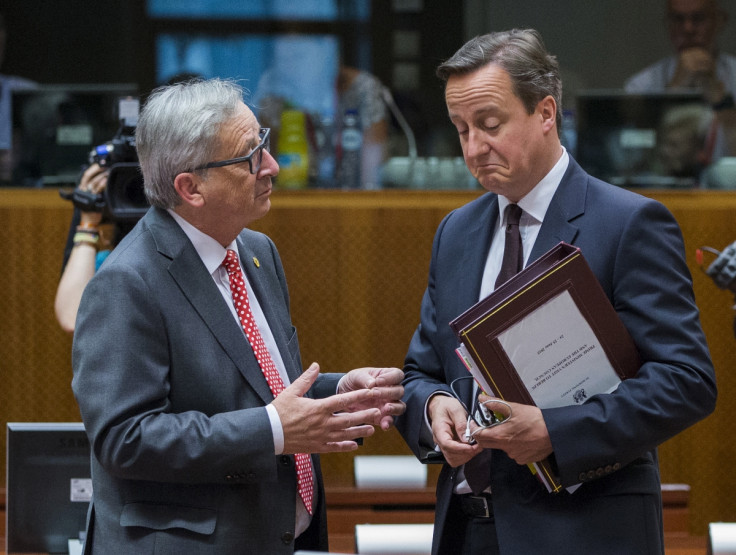EU referendum: Controversial comment by Jean-Claude Juncker gives Brexit a boost

Whether European President Jean-Claude Juncker did say that Britain does not need the European Union or not is no longer the issue. The "leave" campaign groups in the UK are celebrating. Ukip's Nigel Farage has even offered to buy Juncker champagne for backing a Brexit.
In a statement, Farage said: "I want to buy Juncker some champagne. I have always had a personal liking for Jean-Claude Juncker even though we have political differences. His statement today that personally 'I don't think Britain needs the European Union' is spot on."
I have always had a personal liking for Jean-Claude Juncker. He doesn't think Britain needs the EU and neither do I!
https://t.co/wOlGJIs1Xr
— Nigel Farage (@Nigel_Farage) October 14, 2015He was not the only one. Robert Oxley, the spokesperson for the Business for Britain campaign or Vote Leave, said: "In the last two days both the chairmen of Lloyds and JCB have said the UK could thrive outside the EU. It is encouraging to see that Jean-Claude Juncker also agrees.".
Did he or did he not say it? Watch the video and decide. But either way, his comments have raised the hopes of the "leave" campaign.
Most media reported Juncker as saying that Britain did not need the EU, noting that if he had indeed said Britain did not need the EU, then it would have been "quite a statement from a politician tasked with keeping Britain in the bloc.
Juncker's aides quickly moved in to clarify that he said "do" instead of "don't". But by then it was too late. British media were quick to report on the initial statement and Brexit campaigners had already moved in to take advantage of the situation.
In a tweet responding to questions about Juncker's statement, European Commission spokeswoman Natasha Bertaud said her boss said: "I DO think Britain should be in EU. Not everyone in Britain thinks they need Europe. Europe needs Britain.
In his speech to the European Parliament on Wednesday (14 October), Juncker, who is scheduled to meet British Prime Minister David Cameron over lunch today (15 October), said that although he wanted a "fair deal" with the UK, Cameron needs to respect Europe's interest.
He also voiced the impatience of EU officials and diplomats over London's failure to set out a definite set of proposals despite confirming in May that a referendum on the UK's EU membership will be held. British officials however say that negotiations are on track.
British officials say there is no deadline for concluding talks beyond the fact that the referendum will be held by the end of 2017. Draft conclusions of Thursday's meeting, as seen by Reuters, said: "The European Council was informed about the process ahead concerning the UK plans for an (in/out) referendum. The European Council will revert to the matter in December."
Juncker lamented that there has not been much progress made after weeks of technical talks between the UK and EU officials in setting a framework for political negotiations. "I can't say that huge progress has been achieved. I can't say that nothing has been achieved or give details but our negotiations teams have been in talks for weeks now.
"I am not a splendid dancer, but at least I know the rules which have to be observed by others. And it needs two to tango. And so we have to dance and our British friends have to dance. I am 150% in favour of having Britain as a constructive member state of the European Union. We need Britain. Personally, I [do/do not] think that Britain needs the European Union." He continued after the disputed sentence: "But that's a matter of conviction, others will have a different feeling on that.
Growing EU impatience with David Cameron
The continued "vagueness" of Cameron's demands ahead of talks on Britain's continued membership in the EU has caused a lot of frustration among EU leaders and member states. Germany has signalled that the EU summit today will not waste any time on Britain's referendum.
According to the Guardian, the UK's referendum has been relegated to a one-sentence final item on the draft summit declaration after senior officials preparing the agenda said their British counterparts did not appear to have a mandate for negotiations that started in July.
A senior German government official said the British issue "will play no role at the European council. There's no need now for further talks. There have been no negotiations." The main frustration in Brussels and member states is the UK's refusal to state its requirements in writing to supply a solid basis for negotiations. There are concerns that in the absence of a written document, Britain could change its demands, depending on the political situation at home.
© Copyright IBTimes 2025. All rights reserved.






















